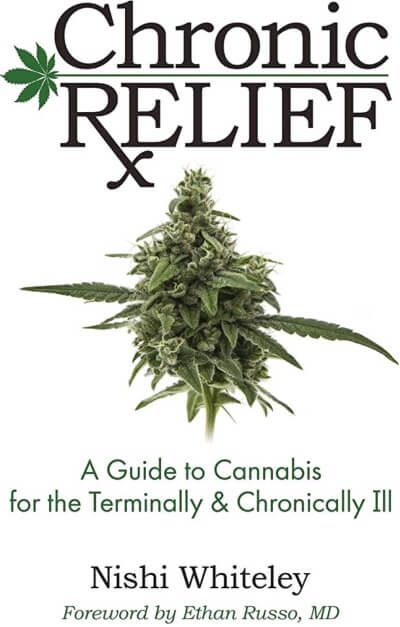Six years ago Nishi Whiteley’s mom was dying of cancer. The pharma drugs weren’t working to control the nausea, loss of appetite, pain, and agitation of her final weeks and months. Nishi had heard that cannabis might help, but she was living in Texas, where it was (and still is) illegal to buy, sell, or consume except in the rarest cases.
She managed to get her hands on some “ditch weed”—the stems, leaves, and seeds college kids could afford back in the ‘70s. She made canna-butter with it, and it seemed to help, but she needed a regular supply and better quality. A compassionate neighbor in Austin came to her rescue. (The New Yorker calls Austin “the [liberal] blueberry in the tomato soup of Texas,” and they’re not wrong . . . cannabis consumption has been decriminalized in Austin, but not in the rest of the state . . . yet.)
Basically I knew nothing about cannabis . . . I was doing this as a mercy mission for my mom.
Whiteley says her mom did well with a steady supply of the good stuff, and though it wasn’t easy, her appetite returned, she felt well enough to have visitors, and her final days were more peaceful than expected.
“Basically I knew nothing about cannabis,” Whiteley says. “Absolutely nothing. Frankly I bought into all the propaganda about, ‘This is your brain. This is your brain on drugs,’ and so I really was doing this as a mercy mission for my mom.”
Read More: Trippy! What Happens When a Grown-Up Woman Tries to Buy Weed
What’s a Cannabis Concierge?
After her mom died, Whiteley made it her mission to learn as much as she could to help other people in similar situations, becoming a de facto “cannabis concierge.”
“I certainly thought that cannabis should be available to people who needed the palliative care and assistance, but I wasn’t in the camp of ‘cannabis should be legal for all people,’” she says.
Whiteley spent five years teaching herself to read medical journals and clinical trial results, gathering her research and thoughts into a comprehensive reference book: Chronic Relief: A Guide to Cannabis for the Terminally & Chronically Ill.
While writing her book, her views on cannabis evolved, and she’s partnered with one of the most respected experts on cannabis, Ethan Russo, MD, to “bring science and reason to the forefront of our conversation about cannabis.” Russo is a board-certified neurologist, and the mission of their company, CReDO Science, is to formulate cannabis-based products targeted to specific areas of the endocannabinoid system to treat pain, inflammation, nausea, and even prevent disease.
The Science Behind It
Just as we have a circulatory system, a lymphatic system, and a cardiovascular system, human bodies have an endocannabinoid system with receptors for this type of plant medicine. One could ask what it’s there for, if not to be receptive to the introduction of cannabis into the body for some benefit.
There is a lot of research—most of it done outside the United States because the federal government still classifies cannabis as a Schedule I—reserved for drugs with no accepted medical benefit and high risk of abuse. However, one hand of the government needs to pick up the phone and call another, because the US government—Health and Human Services—also holds patent number 6,630,507 on the use of compounds in cannabis to protect the brain. The lack of coordination in our federal cannabis policy is stunning, but with a president from the “brain on drugs” generation, it’s unlikely this plant will be rescheduled by the Drug Enforcement Administration before the next election.
Walk into any dispensary in a state where “recreational” or “adult-use” cannabis is legal, and the budtender’s first question is, “Indica or sativa?” With all the new hybrid and high concentrations of THC in new strains, this question is almost meaningless. What matters more is the “entourage effect” of different cannabinoids working together, along with the terpenes that produce different effects in different people.
Getting Questions Answered
But those new to cannabis have many questions, including, “What should I buy, for what effect, and how do I know what amount I can tolerate?” For answers, you could consult a cannabis concierge like Whiteley—even though she doesn’t call herself that. However, she does help patients and other people figure out which strains and brands might work best for their needs. She’s a professional “cannabis educator and advisor,” and even though I was in the industry in California as a consultant, she taught me some things in our virtual interview for NextTribe.
She helps patients figure out which strains and brands might work best for their needs.
Recently I was in California, a state where cannabis is fully legal and you can grow up to four plants for personal consumption. I visited two dispensaries and found lots of new brands of edibles. I’m not a smoker, but I’ve found certain chocolates and gummies very helpful for a nice, restful sleep with no grogginess in the morning (when I’m in a legal state, of course!)
Today Nishi, a NextTribe member, is a partner in CReDO Science, a company that researches the endocannabinoid system with the goal of formulating quality, reliable cannabis products to take advantage of the antibacterial, antioxidant, antidepressant, and other proven properties of cannabis compounds, some of which can kill cancer cells.
A world traveler who is probably more comfortable with a backpack than a briefcase, Nishi has passion for the plant and all of its potential that has turned her “accidental career” as cannabis concierge into a personal mission—in honor of her mother and those like her who suffer needlessly, whether from cancer, arthritis, or more common ailments like the insomnia I suffered from, until I found a cannabis solution.
Jeannie Edmund is the Chief Operation Officer of NextTribe, and author of “Start Me Up: Tips, Tales and Truths about Starting Up and Starting Over.”
Read More: The Reefer Cure: Almost 30 Percent of Us Tame Menopause Symptoms with Weed






















0 Comments